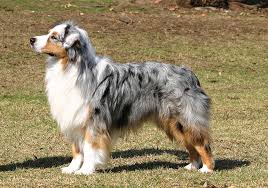
Australian Shepherd
Conditions of detention
Australian Shepherds are adaptable but thrive in environments with ample space to run and play. They are well-suited for homes with large yards or rural settings where they can perform herding tasks.
Useful Fact: They are not ideal for apartment living unless they receive significant daily exercise.
Nutrition and diet
Australian Shepherds require a balanced diet rich in protein to support their active lifestyle. High-quality commercial dog food or a carefully planned homemade diet can be suitable.
Useful Fact: Aussies may be prone to food allergies, so it’s important to monitor for any adverse reactions to certain ingredients.
Health
Australian Shepherds are generally healthy but can be prone to certain genetic conditions like hip dysplasia, epilepsy, and eye disorders.
Useful Fact: Regular veterinary check-ups and genetic testing can help manage and prevent health issues.
Grooming and care
Aussies have a double coat that requires regular brushing to prevent matting and reduce shedding. During shedding seasons, more frequent grooming is necessary.
Useful Fact: Bathing should be done as needed, typically every few months, unless they get particularly dirty.
Education and training
Australian Shepherds are highly intelligent and eager to please, making them easy to train. They respond well to positive reinforcement techniques.
Useful Fact: Early socialization and obedience training are crucial to prevent behavioral issues and harness their intelligence effectively.
Toys and entertainment
Aussies need mental stimulation and physical exercise. Interactive toys, puzzle games, and regular playtime are essential to keep them engaged.
Useful Fact: Herding balls and agility equipment can be excellent for providing both mental and physical stimulation.
Safety
Ensuring the safety of an Australian Shepherd involves secure fencing and supervision during outdoor activities, as their herding instincts can lead them to chase moving objects.
Useful Fact: Microchipping and ID tags are important for quick recovery if they ever get lost.
Accessories
Essential accessories include a sturdy leash and collar, ID tags, grooming tools, and a comfortable bed.
Useful Fact: Investing in a good quality harness can be beneficial for control during walks, especially for younger, energetic Aussies.
Socialization
Australian Shepherds should be exposed to various people, animals, and environments from a young age to develop well-rounded social skills.
Useful Fact: Regular trips to dog parks and participation in puppy classes can greatly enhance their socialization.
Travel and Transportation
When traveling with an Aussie, ensure they are safely secured in a crate or with a dog seat belt. They adapt well to car rides if introduced gradually.
Useful Fact: Frequent breaks during long trips help manage their energy levels and reduce anxiety.
Behavior and psychology
Australian Shepherds are known for their loyalty, intelligence, and strong work ethic. They thrive on companionship and mental challenges.
Useful Fact: Aussies can develop separation anxiety if left alone for long periods, so it’s important to provide them with companionship and activities.
Legal aspects
It’s essential to be aware of local laws regarding pet ownership, including leash laws, licensing, and breed-specific legislation.
Useful Fact: Some areas have restrictions on the number of pets per household, so ensure compliance with local regulations.


